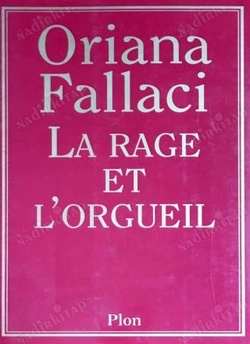 Written in a white heat by the renowned Italian journalist, for many years now a New York resident, Rage and Pride breaks the author's self-imposed decade-long silence to vent on Islam and Muslims. While Fallaci has a long experience with these subjects (having famously interviewed Ayatollah Khomeini and also written Inshallah, a novel about the Italian troops stationed in Lebanon in 1983), she does not pretend to be a specialist and this slim book makes that very clear.
Written in a white heat by the renowned Italian journalist, for many years now a New York resident, Rage and Pride breaks the author's self-imposed decade-long silence to vent on Islam and Muslims. While Fallaci has a long experience with these subjects (having famously interviewed Ayatollah Khomeini and also written Inshallah, a novel about the Italian troops stationed in Lebanon in 1983), she does not pretend to be a specialist and this slim book makes that very clear.
La rabbia e l'orgoglio was a sensation in Italy (selling nearly a million copies), as was La Rage et l'Orgueil in France. In the latter country, its contents raised hackles. After a weekly magazine published extracts, "le Mouvement contre le racisme et l'amitié entre les peuples" sought to have the book banned on the grounds that it is "a scathing Islamophobe attack." Fallaci reported death threats. No shrinking violet, she threatened to countersue MRAP for defamation, but this proved unnecessary when the judge permitted the book to be sold.
Fallaci does not admire Islamic civilization, dismissing it with a broad sweep of the hand as having left "a few beautiful mosques but no contributions to the history of thought" and despising women so deeply that their deaths are of "no importance" at all. She sees Usama bin Ladin not as an extremist but as "the most recent manifestation" of an Islamic reality that is 1,400 years old. She worries for the future of Western civilization ("Muezzins instead of clocks, chador and burqa replacing mini-skirts, camel's milk taking the place of cognac") but makes some rudimentary mistakes (twenty-four million Arab Muslims in the United States?).
La Rage et l'Orgueil like a number of other European attacks on Islam find a wide and receptive audience; really what they show is the primitive nature of the public debate about Islam in those countries.
